"Agha Shahid's India visit". Indian Express . 15 July 1980.
Related Research Articles

Muhammad Zia-ul-Haq was a Pakistani military officer who served as the 6th president of Pakistan from 1978 until his death in 1988. He rose to prominence after leading a coup on 5 July 1977, which overthrew the democratically elected government of prime minister Zulfikar Ali Bhutto. Zia subsequently imposed martial law, suspended the constitution, and served as chief martial law administrator before assuming the presidency. Zia served as the 2nd chief of the Army Staff from 1976 to 1988, a position he later leveraged to execute a coup in 1977, which was the second coup in Pakistan's history of coups; the first occurred in 1958 under Ayub Khan.
Ghulam Ishaq Khan, commonly known by his initials GIK, was a Pakistani bureaucrat, politician and statesman who served as the seventh president of Pakistan from 1988 to 1993. He previously served as Chairman of the Senate from 1985 to 1988 under president Muhammad Zia-ul-Haq, and was sworn in shortly after Zia's death.
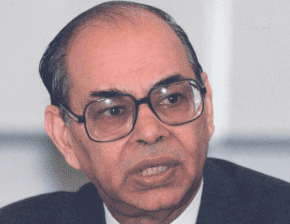
Mahbub ul-Haq was a Pakistani economist, international development theorist, and politician who served as the minister of Finance from 10 April 1985 to 28 January 1986, and again from June to December 1988 as a caretaker. Regarded as one of the greatest economists of his time, Haq devised the Human Development Index, widely used to gauge the development of nations.
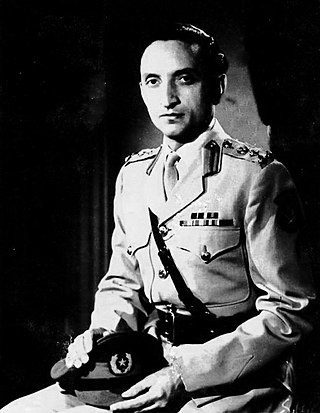
Lieutenant General Sahabzada Mohammad Yaqub Ali KhanSPk was a Pakistani politician, diplomat, military figure, linguist, and a retired general in the Pakistani Army.
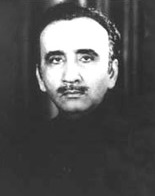
Mohammad Khan Junejo was a Pakistani politician and statesman who served as the tenth Prime Minister of Pakistan from 1985 to 1988 under president Muhammad Zia-ul-Haq. During his tenure as prime minister he sought to strengthen the power of the office and assert civilian control over state affairs, foreign affairs and military appointments, coming into conflict with Zia-ul-Haq and various senior military officers eventually culminating in his dismissal by Zia. His inquiries into the Ojhri Camp Disaster, appointment of Aslam Beg as VCOAS, various Corps Commanders, growing control over senior military promotions, forays into international politics, rejecting Zia appointments in his cabinet, stance against martial law, austerity policies and purported spying on Zia through the civilianized Intelligence Bureau all contributed to the souring in their relation.

Aziz Ahmed OBE HPk was a career Pakistani statesman and a diplomat during the Cold War, serving in the capacity as 13th Foreign Minister of Pakistan from 1973 until 1977. Prior to that, Ahmad served as the Pakistan Ambassador to the United States (1959–63) and eventually appointed Foreign secretary (1960–67) by President Ayub Khan.

Admiral Fasih BokhariNI(M) HI(M) SI(M) SBt PGAT was a Pakistani admiral who served as the Chief of Naval Staff from 1997 to 1999. He was a well-known pacifist and a prominent political figure as the Chief of Naval Staff from 1997 until his voluntary resignation in 1999, which stemmed from his staunch opposition to the then-Pakistani President Pervez Musharraf's instigation of the Kargil War with India, a conflict that Bokhari reportedly saw as an act of inappropriate and uncoordinated aggression from Pakistan and one that subsequently led him into a bitter dispute with Musharraf. Bokhari also served as the chairman of the National Accountability Bureau, a Pakistani anti-corruption agency.

Aftab Ghulam Nabi KaziSPk, SK, also known as AGN Kazi, was a Pakistani civil servant and a bureaucrat during the Cold War and during the post cold war. Kazi was born in Sindh, Bombay Presidency, in 1919 to an academic family. He started his career in the Indian Civil Service in 1944 and served as the Deputy Commissioner of Bihar and Orissa. After the partition of India, Kazi migrated to Pakistan and joined the Provincial Government of Sindh, and held positions such as Secretary of Finance and Secretary to the Governor.
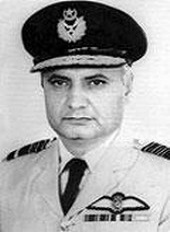
Air Chief Marshal Zulfiqar Ali KhanNI(M), was the first four-star air officer in the Pakistan Air Force and later a diplomat. He was the Air Force's Chief of Air Staff from 15 April 1974 to 22 July 1978. Upon retirement, he served on a diplomatic assignment, and headed the diplomatic mission to the United States as Pakistan's ambassador from 1989 to 1990.

Inam-ul-Haq is a Pakistani career diplomat who served as the Foreign Minister of Pakistan in the caretaker government of Muhammad Mian Soomro for four months from November 2007 till March 2008.

Muhammad Zia-ul-Haq, the sixth president of Pakistan, died in an aircraft crash on 17 August 1988 in Bahawalpur near the Sutlej River. Zia's close assistant Akhtar Abdur Rehman, American diplomat Arnold Lewis Raphel and 27 others also died upon impact.

General Muhammad ShariffNI(M) SPk SI(M) was a senior Pakistan Army general who was the first Chairman of Joint Chiefs of Staff Committee, serving in this post from 1976 until tendering his resignation in 1977 over the disagreement with the military takeover of the civilian government by the Pakistani military.
Raja Muhammad Zafar-ul-Haq, is a Pakistani politician and lawyer, who served as senator from the Punjab, being elected on 12 March 2009. He had been the leader of the opposition in Senate from 2018 to 2021. He is serving as the Chairman of the Pakistan Muslim League (N), a centre-right party, since 20 February 2000.
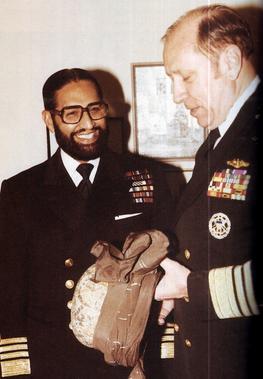
Admiral Mohammad ShariffNI(M) HJ HI(M) LoM, was a Pakistani senior admiral who served as the 2nd Chairman of Joint Chiefs of Staff Committee and a memoirist who was at the center of all the major decisions made in Pakistan in the events involving the war with India in 1971, the enforcement of martial law in the country in 1977, and the decision in covertly intervening against Soviet Union in Afghanistan.
Lieutenant General Zahid Ali AkbarHI(M), SBt, PE, is a former engineering officer in the Pakistan Army Corps of Engineers, known for his role in Pakistan's acquisition of nuclear weapons, and directing the Engineering Research Laboratories (ERL), a top secret research facility developing the clandestine atom bomb project.
Zafar Ali Hilaly is a Pakistani political analyst and diplomat who has previously served as his country's ambassador to Yemen, Nigeria, and from February 2001 Italy. He was educated at Highgate School.
The family of head of state and government in Pakistan is an unofficial title for the family of the head of state or head of government of a country. In Pakistan, the term First Family usually refers to the head of state or head of government, and their immediate family which comprises their spouse and their descendants. In the wider context, the First Family may comprise the head of state or head of government's parents, siblings and extended relatives.

During the 1980s Iran–Iraq War, the foreign policy of Pakistan played a complex role in the war.

Agha Syed Hamid Ali Shah Moosavi was the patron-in-chief of the supreme Shia ullama board and president of Tehrik-e-Nafaz-e-Fiqah-e-Jafaria, the Shiite-law implementation movement. His family is descended from Imam Musa al Kadhim, the seventh imam of Twelver Shias. Moosavi became president of Tehrik-e-Nafaz-e-Fiqah-e-Jafaria of Pakistan after the death of Mufti Jafar Hussain.
References
- 1 2 3 4 5 Agha Shahi passes away (obituary and profile) Dawn (newspaper), Published 7 September 2006, Retrieved 24 November 2018
- 1 2 The India Office and Burma Office List 1947. London: HM Stationery Office. 1947. p. 335.
- ↑ Hall of fame: The ICS (Indian Civil Service) served Pakistan well Dawn (newspaper), Published 4 September 2011, Retrieved 24 November 2018
- ↑ Ex-foreign minister Agha Shahi passes away The News International (newspaper), Published 7 September 2006, Retrieved 24 November 2018
External links
- Pakistan's ex-Foreign Minister Agha Shahi passes away from the Pakistan Times (newspaper) (archived)
- "Former Pakistan foreign minister passes away". Hindustan Times . 6 September 2006 – via PTI.
Agha Shahi | |
|---|---|
| آغا شا ﮨی | |
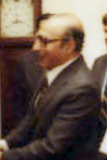 | |
| 13th Minister of Foreign Affairs | |
| In office 14 January 1978 –9 March 1982 |
